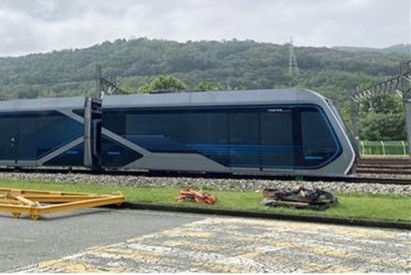South Korea tests domestically-produced tram
Posted on 12th October 2023 at 13:34
A consortium of South Korean companies, including HyundaiRotem, Daejon Transportation and Hyunwoo Systems has spent over two years designing and producing the country’s first domestically-produced low-floor articulated tram, with grants of KRW 4.8bn from the government and KRW 1.1bn from industrial partners, aiming to reduce the need to import equipment.
The fuel cell powered three-section car is being tested at a new facility in the Oesam area of Daejon, featuring 4.6km of sharp curves and plain track, with 5000km to be achieved over the next 10 months. A hydrogen-powered tram with a range of 150km is also in production and will be undergoing tests. The domestic production is not 100%, with Knorr Bremse providing their braking system, door equipment and air conditioning.
Seoul had a first-generation tramway from 1898 until 1968, but is now building the Wirye line, a 5.8km metro feeder, for completion in September 2025 with 10 five-section trams, and another 13.4km line is planned. Busan opened a 14.5km mostly elevated automated light metro line in 2011. Daegu, Busan, Gwangju, Daejon and Seoul have metro lines.
Daejon is planning a 38.1km catenary-free light rail line that will loop around the city centre, including five metro interchanges, with construction work expected to start in 2024. Changwon is also planning a tramway.

The tram on test in Daejon. (HyundaiRotem)
Share this post:

